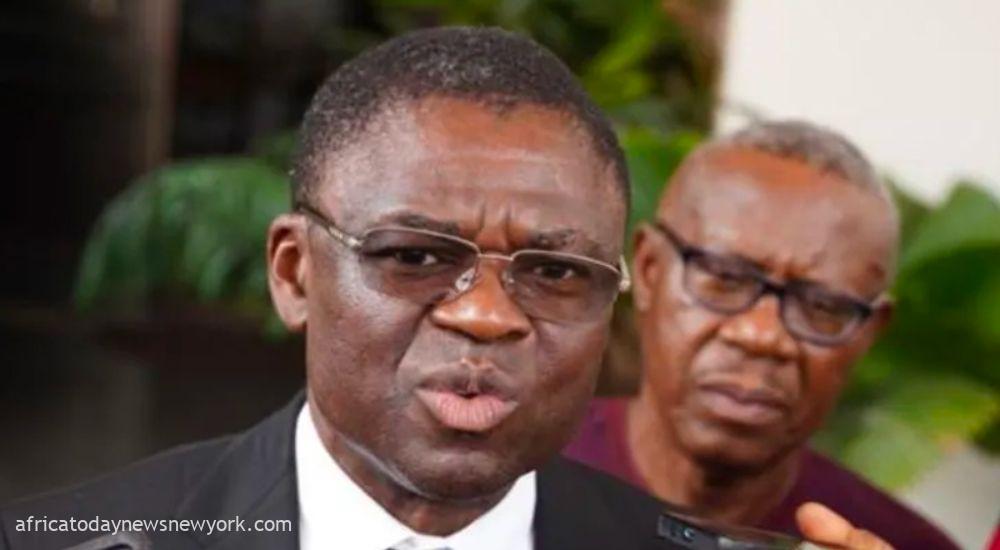On Monday, the Edo State House of Assembly ousted the embattled deputy governor, Philip Shaibu, from his position through impeachment proceedings.
Shaibu’s impeachment was the direct result of the Edo State Chief Judge’s appointment of a seven-member investigative panel to examine claims of misconduct, with their report leading to the Assembly’s decision.
Chaired by Justice S.A. Omonua (retd.), the panel concluded its proceedings on Friday, as Shaibu, failing to attend, faced allegations of perjury and divulging confidential government information during the probe.
Originally adjourned until Thursday for Shaibu to present his defense, the panel extended the deadline to Friday when he failed to appear, yet he still did not respond to the allegations against him, despite the petitioner, the state assembly, having already presented and concluded its case.
At the commencement of the hearing on Wednesday, Shaibu’s attorney, Oladoyin Awoyale, was in attendance but opted to leave partway through after the tribunal dismissed his motion to pause the proceedings pending the resolution of a legal action initiated by Shaibu in Abuja, challenging the validity of his impeachment.
Omonuwa supported the Assembly’s rejection of the suspension request, which was presented by its Deputy Clerk, Joe Ohiafi.
Upon Awoyale’s departure, Ohiafi stepped in to elucidate the Assembly’s perspective on the matter concerning Shaibu.
The House sitting saw the presence of 20 members, including Speaker Blessing Agbebaku, with 18 individuals voting in support of impeachment, while one member refrained from voting.
The deputy governor’s impeachment proceedings commenced with the Clerk of the House proceeding to read out Order 10, which pertained to the presentation and review of the seven-man panel report addressing allegations of gross misconduct against Deputy Governor Philip Shaibu. This specific item was part of the Assembly’s scheduled agenda for consideration.
Without hesitation, Charity Aiguobarueghan, the majority leader of the House, hailing from Ovia North East 1, advanced a motion for the report to be examined.
Read also: Shaibu Impeachment: Inquiry Panel Wrap Up Sessions
His proposal received a second from the Minority Leader, Eric Okaka, representing Owan East.
Thus, with motions initiated by both the Majority and Minority Leaders, and ratified accordingly, the Speaker took charge as chair of the committee of the whole House to assess the report.
While the report was being presented, Donald Okogbe from Akoko-Edo II constituency stood up to raise an objection to Part C of the report, yet the Speaker dismissed his objection.
Afterward, the House reached a resolution stating that the allegation of perjury against the deputy governor was not substantiated, while confirming the validity of the second accusation regarding the disclosure of official secrets.
At this stage, the Majority and Minority Leaders of the Assembly moved and seconded a motion, respectively, that the Speaker revert to his position as Speaker of the House.
The Majority Leader further moved that with regard to Section 188 Subsection 9 of the Constitution, the report be put to vote.
At the end of the voting, 18 members voted in support of the impeachment, while one member abstained.
In his comment, the Speaker, Blessing Agbebaku, said more than two-third majority of the House voted and endorsed the impeachment.
“I hereby, from my seat, announce that the deputy governor, Philip Shaibu, stands impeached,” he declared.
It’s worth recalling that on March 28, Justice I. E. Ekwo directed the respondents, which included the Inspector General of Police, the State Security Service, the chairman of the impeachment panel, Justice S. A. Omonua (retd), and three members of the panel appointed by the Edo State Chief Judge, along with the House of Assembly, to attend court on April 8.
They were required to present arguments against granting an injunction to preserve the current state of affairs until the Originating Motion on Notice was heard and decided.

